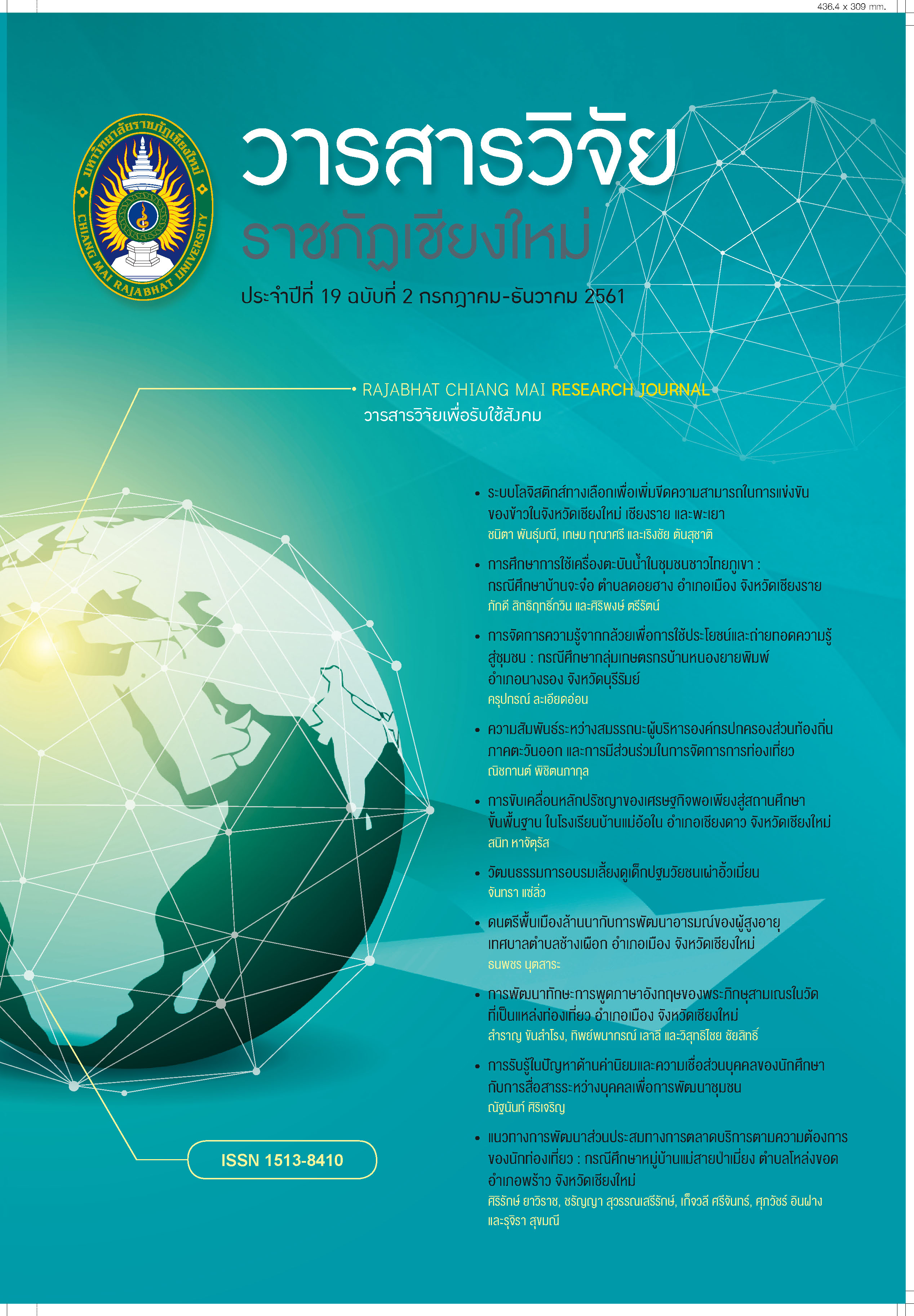การขับเคลื่อนหลักปรัชญาของเศรษฐกิจพอเพียงสู่สถานศึกษาขั้นพื้นฐาน ในโรงเรียนบ้านแม่อ้อใน อำเภอเชียงดาว จังหวัดเชียงใหม่
DOI:
https://doi.org/10.14456/rcmrj.2018.151800คำสำคัญ:
หลักปรัชญาของเศรษฐกิจพอเพียง, สถานศึกษาขั้นพื้นฐานบทคัดย่อ
การวิจัยเรื่องการขับเคลื่อนหลักปรัชญาของเศรษฐกิจพอเพียงสู่สถานศึกษาขั้นพื้นฐานในโรงเรียนบ้านแม่อ้อใน อำเภอเชียงดาว จังหวัดเชียงใหม่ มีวัตถุประสงค์เพื่อขับเคลื่อนหลักปรัชญาของเศรษฐกิจพอเพียงสู่สถานศึกษาขั้นพื้นฐานในโรงเรียนบ้านแม่อ้อใน อำเภอเชียงดาว จังหวัดเชียงใหม่ การดำเนินการวิจัยเป็นการวิจัยเชิงคุณภาพ ศึกษาจากกลุ่มเป้าหมาย จำนวน 28 คน เก็บรวบรวมข้อมูลโดยการศึกษาเอกสาร การสัมภาษณ์เชิงลึก และการสนทนากลุ่ม วิเคราะห์ข้อมูลโดยการสังเคราะห์เนื้อหาและเขียนบรรยายเชิงพรรณนา ผลการวิจัยสรุปได้ดังนี้
การขับเคลื่อนหลักปรัชญาของเศรษฐกิจพอเพียงสู่การบริหารสถานศึกษาของโรงเรียนบ้านแม่อ้อใน อำเภอเชียงดาว จังหวัดเชียงใหม่ โดยยึดองค์ประกอบปรัชญาของเศรษฐกิจพอเพียง ประกอบด้วย 3 องค์ประกอบ ได้แก่ ความพอประมาณ ความมีเหตุผล และการมีภูมิคุ้มกันในตัวที่ดี อยู่บนพื้นฐานของเงื่อนไข 2 ประการ คือ เงื่อนไขความรู้และเงื่อนไขคุณธรรม ซึ่งประกอบด้วยเนื้อหา 2 ส่วน คือ
ส่วนที่ 1 องค์ประกอบของการขับเคลื่อนหลักปรัชญาของเศรษฐกิจพอเพียงสู่การบริหารสถานศึกษาของโรงเรียนบ้านแม่อ้อใน อำเภอเชียงดาว จังหวัดเชียงใหม่ ประกอบด้วย 5 ด้าน คือ 1) ด้านการบริหารจัดการ มี 4 องค์ประกอบ คือด้านนโยบาย ด้านวิชาการ ด้านงบประมาณ และด้านการบริหารทั่วไป 2) ด้านการพัฒนาหลักสูตรและการจัดการเรียนการสอน มี 4 องค์ประกอบ คือด้านหน่วยการเรียนรู้ปรัชญาของเศรษฐกิจพอเพียง ด้านการบูรณาการหลักปรัชญาของเศรษฐกิจพอเพียงสู่การเรียนการสอน ด้านสื่อและแหล่งเรียนรู้เกี่ยวกับปรัชญาของเศรษฐกิจพอเพียง และด้านการวัดและประเมินผลการจัดการเรียนการสอนตามหลักปรัชญาของเศรษฐกิจพอเพียง 3) ด้านการพัฒนาบุคลากร มี 3 องค์ประกอบ คือด้านการแนะแนวและระบบดูแลช่วยเหลือนักเรียน ด้านกิจกรรมนักเรียน และด้านกิจกรรมเพื่อพัฒนาสังคมและสาธารณะประโยชน์ 4) ด้านการจัดกิจกรรมพัฒนาผู้เรียน มี 2 องค์ประกอบ คือด้านการพัฒนาบุคลากรตามหลักปรัชญาของเศรษฐกิจพอเพียง และด้านการติดตามและขยายผล 5) ด้านผลลัพธ์/ภาพความสำเร็จ มี 4 องค์ประกอบ คือด้านสถานศึกษา ด้านผู้บริหารสถานศึกษา ด้านบุคลากรของสถานศึกษาและด้านผู้เรียน
ส่วนที่ 2 แนวทางการการขับเคลื่อนการบริหารสถานศึกษาขั้นพื้นฐานตามหลักปรัชญาของเศรษฐกิจพอเพียงในโรงเรียนบ้านแม่อ้อใน อำเภอเชียงดาว จังหวัดเชียงใหม่ควรกำหนดแนวทางการดำเนินงานดังนี้ 1) กำหนดนโยบายการจัดการศึกษาตามหลักปรัชญาของเศรษฐกิจพอเพียงเป็นนโยบายสำคัญของสถานศึกษา 2) พัฒนาความรู้ความเข้าใจแก่บุคลากรทั้งผู้บริหาร ครู และคณะกรรมการสถานศึกษา และส่งเสริมให้ปฏิบัติตนตามหลักปรัชญาของเศรษฐกิจพอเพียง และประชาสัมพันธ์เผยแพร่ความรู้ ความเข้าใจแก่ผู้เกี่ยวข้อง 3) ทบทวนหรือปรับปรุงโครงสร้างและพัฒนาการบริหารจัดการตามหลักปรัชญาของเศรษฐกิจพอเพียง 4) จัดทำ ปรับปรุง หรือเพิ่มเติมโครงการ กิจกรรม และปรับแผนกลยุทธ์และแผนปฏิบัติการของสถานศึกษา 5) ปรับปรุงและพัฒนาหลักสูตรของสถานศึกษาและจัดการเรียนการสอนตามหลักสูตรสถานศึกษา 6) เสริมสร้างบรรยากาศ และสภาพแวดล้อมให้เอื้อต่อการเรียนรู้ 7) จัดระบบนิเทศ ติดตาม ประเมินผล และรายงานผลการดำเนินงาน 8) ให้ผู้ปกครองและชุมชนเข้าร่วมในการจัดการศึกษาในขั้นตอนสำคัญทุกขั้นตอน
Downloads
เอกสารอ้างอิง
เกษม วัฒนชัย. (2550). เศรษฐกิจพอเพียงตามแนวพระราชดำริ. วารสารดำรงราชานุภาพ, 7(24), 60-67.
ปรียานุช ธรรมปิยา. (2557). การขับเคลื่อนปรัชญาของเศรษฐกิจพอเพียงด้านการศึกษา. กรุงเทพฯ:มูลนิธิยุวสถิรคุณ.
พงศธร โพธิแก้ว. (2560). ลักษณะผู้บริหารมืออาชีพตามทัศนะของผู้บริหารและครูในโรงเรียนอำเภอเมือง จังหวัดพะเยา สำนักงานเขตพื้นที่การศึกษามัธยมศึกษาเขต 36 .วารสารวิจัยราชภัฏเชียงใหม่. 18(2), 109-120.
มูลนิธิสถิรคุณ. (2560). ศูนย์สถานศึกษาพอเพียง มูลนิธิยุวสถิรคุณ. 2 กรกฎาคม 2560 . https://www.sufficiencyeconomy.org
สำนักงานคณะกรรมการการศึกษาขั้นพื้นฐานสำนักงาน. กระทรวงศึกษาธิการ. (2560). คู่มือการบริหารสถานศึกษาขั้นพื้นฐาน. กรุงเทพมหานคร: โรงพิมพ์ศาสนา.
สํานักงานเลขาธิการสภาการศึกษา. (2550). สภาวะการศึกษาไทย ปี 2557/2558 “จะปฏิรูปการศึกษาไทยให้ทันโลกในศตวรรษที่ 21 ได้อย่างไร”. กรุงเทพฯ: สกศ..
สำนักนโยบายและยุทธศาสตร์. (2550). แผน 10 ยุทธศาสตร์สุขภาพพอเพียง. (พิมพ์ครั้งที่ 2). กรุงเทพฯ : โรงพิมพ์องค์การสงเคราะห์ทหารผ่านศึก.
สุธรรม ธรรมทัศนานนท์. (2560). การพัฒนารูปแบบการบริหารจัดการตามหลักปรัชญาของเศรษฐกิจพอเพียง สำหรับสถานศึกษาสังกัดสำนักงานเขตพื้นที่การศึกษามัธยมศึกษา เขต 27. วารสารศึกษาศาสตร์, 28 (1), 140-153.
สุเมธ ตันติเวชกุล. (2550). เศรษฐกิจพอเพียง. วารสารราชภัฏกรุงเก่า, 14 (23), 1-11.
ดาวน์โหลด
เผยแพร่แล้ว
รูปแบบการอ้างอิง
ฉบับ
ประเภทบทความ
สัญญาอนุญาต
1. บทความ ข้อมูล เนื้อหา รูปภาพ ฯลฯ ที่ได้รับการตีพิมพ์ใน “Community and Social Development Journal” ถือเป็นลิขสิทธิ์ของ Community and Social Development Journal มหาวิทยาลัยราชภัฏเชียงใหม่ และเพื่อให้เผยแพร่บทความได้อย่างเหมาะสมผ่านสื่อสิ่งพิมพ์และอิเล็กทรอนิกส์ ผู้เขียนยังคงถือครองลิขสิทธิ์บทความที่ตีพิมพ์ภายใต้ใบอนุญาต Creative Commons Attribution (CC BY) ซึ่งอนุญาตให้เผยแพร่บทความซ้ำในแหล่งอื่นได้ โดยอ้างอิงต้องอ้งอิงบทความในวารสาร ผู้เขียนต้องรับผิดชอบในการขออนุญาตผลิตซ้ำเนื้อหาที่มีลิขสิทธิ์จากแหล่งอื่น
2. เนื้อหาบทความที่ปรากฏในวารสารเป็นความรับผิดชอบของผู้เขียนบทความโดยตรง ซึ่งกองบรรณาธิการวารสารไม่จำเป็นต้องเห็นด้วยหรือร่วมรับผิดชอบใดๆ














